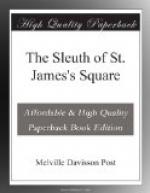He paused and blew a tiny ring or smoke out over the terrace toward the sea.
“There was a certain poetic justice finally in that case,” he added.
“The prisoners were properly convicted of the Haymarket murders,” said the American Justice.
“Ah, no doubt,” returned the Count; “but I was not thinking of that. Following a custom of your courts, I believe, the judge at the end of the trial put the formal inquiry as to whether the prisoners had anything to say. Whereupon they rose and addressed him for six days!”
He bowed.
“After that, monsieur, I am glad to add, they were all very properly hanged.
“But, monsieur, permit me to return to my question: Do you think any intelligent tribunal on this earth would acquit Bough of Oak of the murder of Corporal Flint under the conditions I have indicated?”
“No,” said the American. “It would be a cold-blooded murder; and in the end the creature would be executed.”
The old Count turned suddenly in his chair.
“Yes,” he said, “in a Continental court, it is certain; but in America, monsieur, under your admirable law, founded on the common law of England?”
“I am sure we should hang him,” replied the American.
“Monsieur,” cried the old Count, “you have me profoundly puzzled.”
It seemed to the little group on the terrace that they, and not the Count, were indicated by that remark. He had stated a case about which there could be no two opinions under any civilized conception of justice. Sir Henry Marquis had pointed out the only element — a state of war — which could distinguish the case from plain premeditated murder in its highest degree. They looked to him for an explanation; but it did not immediately arrive.
The Count noticed it and offered a word of apology.
“Presently — presently,” he said. “We have these two words in Italian — sparate! and aspetate! Monsieur.”
He turned to the American:
“You do not know our language, I believe. Suppose I should suddenly call out one of these words and afterward it should prove that a life hung on your being able to say which word it was I uttered. Do you think, monsieur, you could be certain?
“No, monsieur; and so courts are wise to require a full explanation of every extraordinary fact. George Goykovich, an Austrian, having no knowledge of the Italian language, swore in the court of an American state that he heard a prisoner use the Italian word sparate! and that he could not be mistaken.
“I would not believe him, monsieur, on that statement; but he explained that he was a coal miner, that the mines were worked by Italians, and that this word was called out when the coal was about to be shot down with powder.
“Ah, monsieur, the explanation is complete. George Goykovich must know this word; it was a danger signal. I would believe now his extraordinary statement.”




